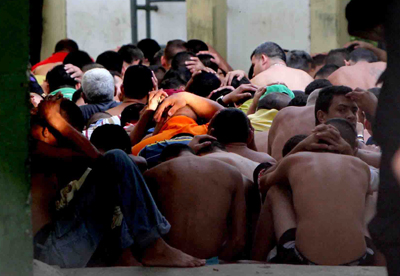New York, October 19, 2011–Venezuela’s telecommunications regulator has fined Globovisión, the country’s last remaining critical network, more than US$2 million for its coverage of deadly prison riots in June and July, news reports said.
The fine stems from Globovisión’s coverage of a tense 27-day standoff between government troops and prisoners at the country’s El Rodeo II Prison in the city of Guatire, outside the capital, Caracas. The conflict began after troops raided a nearby prison looking for weapons, which set off gunfights that killed at least 22 people, according to news reports.
Pedro Maldonado, director of the National Telecommunications Commission, known as Conatel, told reporters that in Globovisión’s televised interviews with relatives of prisoners, which were rebroadcast 269 times, the station violated the law on social responsibility in radio and television that, among other things, sanctions stirring public anxiety. He said the station falsely claimed that members of the National Guard had “massacred” prisoners and that the reporting could have provoked riots in other prisons. He also claimed that Globovisión failed to transmit the government’s point of view in a timely manner.
The fine of 9,300,000 bolívares (approximately US$2,164,000) is equal to 7.5 percent of Globovisión’s gross income for 2010, according to Maldonado. The director said in a news conference on Tuesday that the fine was the unanimous decision of the 11 members of the body’s social responsibility directorate, press reports said.
“Yet again, Venezuela is attempting to silence the television station Globovisión, this time saying the television station’s reporting stirred public anxiety,” said Carlos Lauría, CPJ’s senior coordinator for the Americas. “Venezuelan authorities must end their systematic campaign of harassment against one of the country’s only remaining critical media groups and withdraw the fine.”
Globovisión president Guillermo Zuloaga, who is living in exile, said the station would go before the Venezuelan courts to appeal the decision, which he called “grotesque and absurd,” the network said. But under Venezuelan law, the fine cannot be deferred until a final court decision is handed down, and Maldonado said the fine must be paid by December 31.
Ricardo Antela, a Globovisión legal adviser, told CPJ that the station did its best to report an important story under extremely difficult circumstances. He said the station’s reporters were forced to cover the story from outside a security cordon more than half a mile away from the prison. He also said the government made no official declaration until six days after the riots began and that government officials refused to speak to Globovisión about the crisis.
Globovisión Vice President María Fernanda Flores told reporters that the fine could bankrupt the station, which receives no government advertising. But she also vowed to continue transmitting the news. “There is no way to pay that much money,” she said in an interview broadcast by the station. “We will continue to inform the public. We have never censored ourselves and we are not going to. We are not scared,” she said.
However, Antela said, if Globovisión does not pay the fine, the state could seize Globovisión’s bank accounts, making it impossible to pay employees and suppliers, and effectively shut down the station. He also said that eight of the 11 members of Conatel’s social responsibility directorate were government appointees and added that the fine was an attempt to silence a critical voice. He said there was little hope of winning an appeal before the pro-government Venezuelan courts but said the station would take the case to the Inter-American Court of Human Rights.
Globovisión, a 24-hour news station, has frequently sparred with President Hugo Chávez and his administration, of whom it has been highly critical. In August 2009, a group of more than 30 armed pro-government militants riding motorcycles stormed the network’s premises and set off tear gas. Earlier that year, Venezuelan regulators opened five administrative proceedings against the broadcaster on similar charges.
Globovisión is the only network critical of Chávez that is still on the air. Another opposition station, RCTV, was forced off cable and satellite TV in 2010 after its broadcast license was revoked in 2007.
